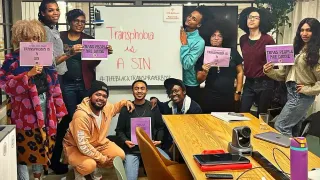
3 hours ago
John Whaite Opens Up: Unmasking Steroids, Body Image, and Queer Resilience
READ TIME: 3 MIN.
It’s not every day a queer icon peels back the sequins and spotlights the shadows beneath. But that’s exactly what happened when John Whaite—winner of The Great British Bake Off and a runner-up on Strictly Come Dancing—publicly confessed to a five-year struggle with illegal steroid use. Whaite, who has charmed millions with his kitchen wizardry and dancefloor flair, bared his soul in a raw Instagram video, recounting the “devastating impact” steroids had on his body, mind, and sense of self .
“In the past five years, I’ve let myself down, mentally and physically, ” Whaite told his followers, his voice trembling with honesty . “The addiction has messed with my life. ” It’s a confession that resonates far beyond one celebrity’s timeline—echoing in queer gyms, clubs, and bedrooms everywhere.
For LGBTQ+ people, body image isn’t just a personal struggle; it’s a cultural battleground. The pressure to conform to a certain “look”—lean, muscular, flawless—can feel especially sharp in queer spaces, where acceptance is often tangled up in appearance . Whaite’s confession is a bold refusal to play along with toxic standards.
He began taking steroids, he admits, because he was “unhappy with his body. ” That feeling will sound achingly familiar to countless LGBTQ+ folks who’ve faced the mirror and found only judgment staring back . “It was supposed to make me feel better, but it only made things worse, ” Whaite said in his video . The admission is both heart-breaking and galvanizing—a reminder that even those who seem to “have it all” aren’t immune to the demons of self-doubt.
Steroid use—especially among gay and bisexual men—remains an open secret in many LGBTQ+ circles. From locker rooms to dating apps, the drive to sculpt the “ideal” body can lead people down dangerous paths. Whaite’s revelation lifts the curtain on a crisis that’s often whispered about but rarely seen in daylight .
His story is a cautionary tale: the side effects weren’t just physical , but emotional, too. “I lost touch with who I was supposed to be, ” Whaite confessed . The cost of fitting in, it turns out, can be one’s own sense of self.
Whaite’s vulnerability isn’t just brave—it’s revolutionary. By naming his struggle, he opens the door for conversations about queer mental health, recovery, and the need for self-compassion . His journey echoes the experiences of many LGBTQ+ people who have felt pressured to change their bodies just to feel worthy.
But Whaite’s message isn’t just about pain. It’s about possibility. In his Instagram video, he shared how he’s now focusing on “self-acceptance and healing, ” urging others to seek support if they’re struggling . The response from the community has been powerful—thousands of messages pouring in, many thanking him for his honesty and courage .
In a culture that often celebrates strength and perfection, Whaite’s story is a reminder that true pride comes from authenticity. His confession challenges us all to rethink how we value ourselves—and to stand in solidarity with those still fighting their own battles in silence.
Whaite’s candor has already started a ripple effect. Health organizations and queer advocates have seized the moment to call for more resources, education, and open dialogue around steroid misuse and body image in the LGBTQ+ community . It’s a chance to rewrite the script: to tell younger generations that their worth isn’t measured in muscle, but in kindness—especially towards themselves.
As the sequins settle and the applause fades, John Whaite’s legacy may prove to be more than a trophy or a perfect bake. By sharing his truth, he’s helping us all find a little more light in the mirror.






